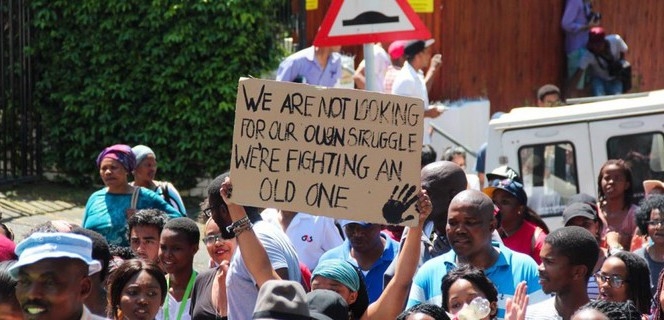Ten days of student protests have won a victory.
It was like a comatose giant briefly awakening from his slumber. Filling South African TV screens (for he spoke only on camera, having refused to go out to face ‘violent’ students protesting at his government buildings), South Africa’s President Jacob Zuma slowly spoke the words ‘0 % university fee increase’. The rest of what he said lasted only a few minutes, during which he stayed fully motion- and expressionless. There was no explanation, no engagement in debate, not a hint of a plan that could fill the gap now present in universities’ budgets. By the time the camera switched off, the TV watching public was left with the feeling that their countries’ president had gone back to sleep.
But the focus of the many who had, in recent years, increasingly despaired about the current South African government –by now little more than a greedy and uncaring circus of nepotists, so-called ‘tenderpreneurs’ and vassals doing the bidding of anyone powerful enough to give them a nice directorship- , was not on Zuma for very long. There was after all something much, much more interesting and encouraging to look at and that was the student movement itself.
Before last week, nobody had known that there were so many passionate and dedicated young people in South Africa. At the beginning of the protests, large parts of the public had still scoffed: when would these silly youngsters stop making noise, blocking the streets and behaving like hooligans? “Deal with hooligans,” urged a (later deleted ) tweet from the @MyANC_ account.
And then it began to change. These students were, people started to see, actually not behaving like hooligans at all. Besides some incidents, -most of which provoked by unnecessary police heavy-handedness and intrusions by some thuggish-looking individuals who were most likely not students themselves-, they were marching peacefully. They discussed politics with bystanders, helped one another with water and distributed caps to prevent sunstroke. They talked with police in a non-aggressive way, telling them that "this is for your children, too;” they quoted Chinua Achebe; they showed a passion for building South Africa’s future along with their own that put many an older person to shame. They were together: when black students were manhandled by police, white students were asked to come forward and so they did and formed a human shield. (No one had had any need to have it explained to them that even today, policemen of any colour would still treat black targets with more violence than white ones).
In a country disillusioned and paralysed, its children were suddenly leading the way. Comparisons with the student uprisings in Soweto in 1976 are perhaps too grand, but ‘23 October’ is, for the moment at least, a thing on South Africa’s social media. “My child, I was there,” posted a Soweto veteran on Facebook. “I was hoping my children would never have to go through such an experience, but now that you are fighting, I am so, so proud of you.” Other old activists were dispensing tear gas handling advice to their children and grandchildren; resentful officials biding their time in dysfunctional state departments were suddenly seen smiling at Facebook posts showing young women and men earnestly attending evening classes whilst occupying their universities. And picking up the litter, and mopping the floors, after class was done.
With the students, teaching, discussing and helping, were sympathetic lecturers who knew and understood that these were children whose grandparents had had to sign away their pension fees just to keep them there for one more year; whose parents worked 4 AM to 8 PM jobs; that one of the protesting boys came from a long line of domestic workers and ‘garden boys’, and that he, if fees didn’t fall, was likely to become a ‘garden boy’ too. These lecturers brought ice water to local marches, joined the march to the Union Buildings and stood at their universities’ gates to congratulate returning students after Friday’s victory.
There were also, of course, lecturers, professors and others –particularly also government broadcaster SABC- who didn’t understand any of this. Who only saw noise and disruption and, -as the theme on the government TV station was throughout victory Friday-, ‘violence.’ They didn’t get that in today’s South Africa, the country with the widest gap between rich and poor in the entire world, university has become the one bridge between possibly having a future and none at all. Or that mismanagement and neglect of the entire education sector has in recent years made it increasingly torturous for anyone-not-rich to cross that bridge. Or that, whilst the political elite lazily enriches itself and old class privileges continue to benefit the lucky few, the wealth gap still widens by the day.
It is this that gradually started to dawn on the South African public last week: that, even if study fees are still crazy high and the real struggle has perhaps only just begun, this was not about ‘spoiled brats’ behaving badly, but about the country’s new hope.


